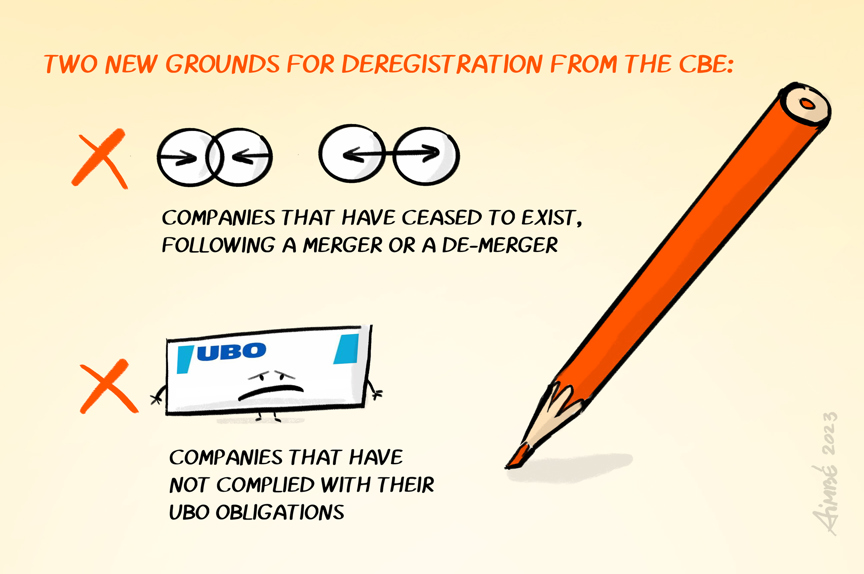- Commercial and Economic Law
- automatic removal from the CBE , Crossroads Bank for Enterprises , CBE , ex officio removal , merger , de-merger , UBO obligations , not complied with their UBO obligations , failing to comply with its UBO obligations , not provided confirmation regarding its data , deletion
Recently, the department managing the Crossroads Bank for Enterprises (CBE) has two new reasons to automatically remove a company from the register.
First, we will give you an overview of those reasons the management of the CBE already had in this context and then discuss the two new grounds. In this way, you will avoid unpleasant surprises as a company.

1. The standard procedure
When the management department has identified incorrect data or missing info in a registration, it requests the registered entity by registered letter to correct incorrect data or to add missing info. The company has a period of 30 days after sending the letter to do so. If it still fails to comply with its legal obligations, the management department will proceed with deregistration.
The management department sends the letter to the entity's registered office or, in the case of a foreign entity, to the address of one of its branches.
When the cancellation procedure concerns an address, the letter is sent to an address, registered in the CBE, that is different from the address that is the subject of the cancellation procedure. This is possible only if the address of the establishment unit is different from that of the registered office.
If the management department has no address at all, it sends the letter to the address of a mandatory's domicile.
It may also happen that it is impossible for the management department to contact the company. In such a situation, the management department simply proceeds with the automatic cancellation.
As you can imagine, many problems arise even at this stage. It is enough for a business manager not to receive this letter from the management department (in time) only to suddenly find out that his company has been removed from the register.
2. The five reasons for ex officio removal from the register
In deviation from the standard procedure, the CBE's management department has the following five reasons for ex officio cancellation:
- when the founder of a company (natural person) is deceased for at least 6 months according to data from the national register;
- when the closing of the liquidation of a legal entity has been pronounced 3 months ago;
- three months after the decision to close the liquidation of a legal entity;
- when a company has not filed its annual accounts for 3 consecutive financial years.
- The fifth reason for deletion is of a more exceptional order. It concerns companies that do not fall under the fourth reason but still meet the following cumulative criteria:
- not having had active capacities, activities or establishment units for at least 3 years and being registered in the CBE with an active status;
- not having current admission or capacity applications registered in the CBE;
- no changes made with regard to the data in the CBE for seven years;
- no publications made in the Annexes of the Belgian Official Gazette, except fort he filing of the annual accounts, for seven years.
In this way, the government wants to eliminate 'dormant companies'.
3. The two new reasons
Two new reasons are added to those mentioned above.
Deregistration by the CBE will now also be possible in the following two cases:
- First, the management department may delete still active data of companies that have ceased to exist, following a merger or a de-merger.
This is subject to the condition that the merger or de-merger has been in effect for at least three months. This will make it possible to discontinue data of entities that no longer legally exist. - Second, companies that have not complied with their UBO obligations will also not escape deletion.
The deletion will be possible in three different situations:- The company has received an administrative sanction for failing to comply with its UBO obligations, and has failed to correct or transmit data;
- The company has not provided confirmation regarding its data in the UBO register for 1 year;
- The company has not filed information on the beneficial owners or has not made any publication in the Belgian Official Gazette for at least 7 years.
4. Can a deletion be reverted?
In two cases, the management department may undo the deletion, namely in the event of a manifest error by an authority or the department or when one of the cumulative conditions of the fifth reason is no longer fulfilled.
5. Effects of the removal
Removal is an administrative measure and has no impact on the legal status of the company. As a result, the company keeps its legal personality and must continue to fulfil all its legal, accounting, social and tax obligations.
Nevertheless, deregistration does have significant consequences, such as:
- A prohibition to carry out the cancelled activities, resulting in criminal sanctions;
- The deletion is published in the Belgian Official Gazette, thus informing third parties of the situation;
- All the company's legal actions become inadmissible.
Would you like more information or assistance from the specialists at Seeds of Law? Please do not hesitate to contact us at +32 (0)2 747 40 07 or at info@seeds.law.








